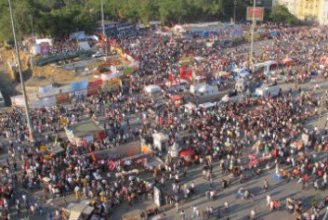 Still smarting from their ouster Saturday from Istanbul's Taksim Square, demonstrators planned to meet at 9 p.m. Wednesday in 11 neighborhoods to discuss how to proceed.
Still smarting from their ouster Saturday from Istanbul's Taksim Square, demonstrators planned to meet at 9 p.m. Wednesday in 11 neighborhoods to discuss how to proceed.
Using social media to organize, hundreds of youths met Tuesday in at least seven forums to carry out such planning.
A total of 883 people have been detained under protest-related charges since May 31, said Emre Cokgezen, a member of the Istanbul Bar Association's crisis desk, which was created to handle detention issues related to the protests.
Though most of those have been released, 71 remained in custody facing terrorism charges, 20 facing organized crime charges and 28 facing other charges, he said.
Nine other people have been missing for more than 10 days, he said.
Defense lawyers were to meet Wednesday with the prosecution at the Istanbul Adalet Sarayi, one of Europe's largest courthouses, to receive prosecution files.
In the lobby of the courthouse, about 15 people -- including a judge -- continued Wednesday the "standing man" protest initiated Monday by a lone man in Taksim Square.
For more than five hours, Erdem Gunduz had stared toward a portrait of Kemal Ataturk, the founder of the modern Turkish state, whose likeness adorns the side of the Ataturk Cultural Center in the square. By Tuesday, hundreds of other protesters were emulating him.
Despite the presence of police in the square, a few "standing man" protesters continued their vigils Wednesday.
Their quiet defiance contrasted with the mayhem in the square Saturday, when police broke up anti-government protests with tear gas and water cannons.
Turkey has been wracked by more than two weeks of protests against the government of Prime Minister Recep Tayyip Erdogan.
The unrest began in Istanbul in late May, when a small group of people turned out to protest government plans to bulldoze Gezi Park, the city's last green space, and replace it with a shopping mall housed inside a replica of 19th-century Ottoman barracks.
Protesters said the plans represented a creeping infringement on their rights in a secular society.
Turkey was founded after secularists defeated Islamic Ottoman forces in the early 20th century, and many modern-day secularists frown on Ottoman symbols.
Soon after the demonstrations began, security forces cracked down. Instead of ending the activity, however, the crackdown prompted more people to come out, many calling for political reforms.
The unrest also brought political risks for Erdogan, a populist and democratically elected politician serving his third term in office.
Speaking Tuesday to a parliamentary group meeting of his Justice and Development (AK) Party, Erdogan said he had no intention of restricting anyone's democratic rights. "If you want to make a protest, do it, do it, but do it within the framework of law," he said.
He accused the international media of misrepresenting events in Turkey.
"Vandalism (footage) was twisted and displayed as if it was an innocent environmental protest," he said. "International media reported on this in a manner to deceive those who are not acting with them to their side."
Erdogan reiterated that the government will abandon its plans to build in Gezi Park if the people of Istanbul vote against them.
Erdogan plans to muster a show of support this weekend in the Turkish heartland, where he has a strong base.
Rallies are to be held on behalf of the Justice and Development Party in Kayseri on Friday, in Samsun on Saturday and in Erzurum on Sunday.
U.N. High Commissioner for Human Rights Navi Pillay on Tuesday expressed concern about the tactics used by security forces against demonstrators.
"I am particularly concerned about allegations of excessive use of force by police against peaceful groups of protesters as this may have resulted in serious damage to health," she said in a statement issued from Geneva.
But Erdogan defended the police approach.
"The police forces have passed the democracy test," he said Tuesday, according to the semiofficial Anadolu Agency news service.
He described the use of tear gas on protesters as an "incontestable right of police" and the demonstrations as "an unprincipled, immoderate movement that is based on lies and deception," Anadolu reported.
While the protests are unlikely to threaten the rule of Erdogan, who is credited with overseeing a decade of economic growth, they are raising questions about what critics say is an increasingly authoritarian style of governing.
Journalist Karl Penhaul and CNN's Gul Tuysuz reported from Istanbul, and journalist Ian Lee reported from Ankara. CNN's Salma Abdelaziz, Arwa Damon and Joe Duran in Istanbul, Antonia Mortensen in Ankara and Tom Watkins in Atlanta contributed to this report.
- Home
- News
- Opinion
- Entertainment
- Classified
- About Us
 MLK Breakfast
MLK Breakfast- Community
- Foundation
- Obituaries
- Donate
04-15-2024 10:04 pm • PDX and SEA Weather


















































































































































































































































































































